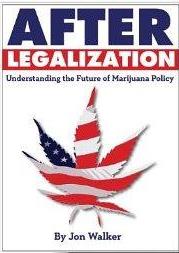Inspired by the border child immigration crisis, but rooted in a broader understanding of the drug war's impact on children on both sides of the border, a coalition has formed to demnand it's end -- for the kids.
Drug War Chronicle needs your support to continue our mission! Please make the most generous donation you can today. We continue to offer a range of membership gift items as well.
And then there were three. The District of Columbia will join Alaska and Oregon in voting on marijuana legalization this fall. Because of DC laws, the DC measure would legalize possession and cultivation only; taxation and regulated sales would be left to elected officials.
A bill that attempts to both reduce the diversion of prescription medications and ensure that people with medical needs have access to them has passed the House and now goes to the Senate.
Medical marijuana bills pick up some support in Congress, Maryland and Minnesota issue draft rules, California continues to be a battleground, and more.
ProCon.org is a series of in-depth web sites presenting information and views from on current issues, several with relevance to drug policy. The Chronicle is currently running a series of info items from ProCon.org -- this one from medicalmarijuana.procon.org -- and we encourage you to check it out.
A fleeing drug suspect and the driver of a vehicle with which he collided were killed last Friday night in Durham, North Carolina. They become the 28th and 29th persons to die in US domestic drug law enforcement operations this year.
A Chicago cop helps his daughter-in-law grow medical marijuana for her cancer-stricken child, then rats her out; a Miami narc gets nailed for helping pot growers, a Baltimore cop's pill habit gets the best of him, a Colorado probation officer gets caught with coke and crack, and a Seattle-are deputy goes to jail for pimping his wife. Just another week of drug-related law enforcement corruption.
One study finds that Colorado is doing just fine with marijuana legalization, another finds that kids aren't smoking more pot in medical marijuana states, there's trouble in Albuquerque, Detroit police go on yet another well-publicized mass drug sweep, Marc Emery vows revenge, and more.
The New York Times isn't done talking about marijuana, a House committee hears about stoned driving, comment now on Maryland's draft medical marijuana regulations, federal asset forfeiture and overdose prevention bills get introduced, and more.
Sentencing reform bills look to be picking up steam in Congress, Massachusetts is expanding drug courts, Tennessee's welfare drug test law generates unimpressive results, drug reform conferences are coming in Latin America, and more.
It's the slow season in Congress and at state houses, but it's the beginning of eradication season in the fields. Plus, the Oregon legalization initiative has raised a million bucks, the drug war racks up two more domestic deaths, and more.
DC will vote on legalizing marijuana possession and cultivation, two more Michigan towns vote to decriminalize, Maine's governor unveils a plan to force people with drug felonies to undergo drug tests before getting welfare benefits, an Austrian marijuana legalization initiative gets underway, and more.
In a move precipitated by the child immigration border crisis, but informed by the ongoing damage done to children on both sides of the border by law enforcement-heavy, militarized anti-drug policies, a broad coalition of more than 80 civil rights, immigration, criminal justice, racial justice, human rights, libertarian and religious organizations came together late last week to call for an end to the war on drugs in the name of protecting the kids.

The failures of the war on drugs transcend borders. (wikimedia.org)
"The quality of a society can and should be measured by how its most vulnerable are treated, beginning with our children," said Asha Bandele of the Drug Policy Alliance, the organization that coordinated the letter. "Children have every right to expect that we will care for, love and nurture them into maturity. The drug war is among the policies that disrupts our responsibility to that calling."
The groups, as well as prominent individuals such as The New Jim Crow author Michelle Alexander, signed on to a letter of support for new policies aimed at ending the war on drugs.
"In recent weeks," the letter says, "the plight of the 52,000 unaccompanied children apprehended at the US border since last October, many of whom are fleeing drug war violence in Central America, has permeated our national consciousness. The devastating consequences of the drug war have not only been felt in Latin America, they are also having ravaging effects here at home. All too often, children are on the frontlines of this misguided war that knows no borders or color lines."
Organizations signing the letter include a broad range of groups representing different issues and interests, but all are united in seeing the war on drugs as an obstacle to improvement. They include the Black Alliance for Just Immigration, Center for Constitutional Rights, the Institute of the Black World, Presente.org, Students for Liberty, United We Dream, the William C. Velasquez Institute, and the Working Families Organization. For a complete list of signatories, click here. [Disclosure: StoptheDrugwar.org, the organization publishing this article, is a signatory.]
In the past few months, more than 50,000 minors fleeing record levels of violence in the Central American countries of El Salvador, Guatemala, and Honduras have arrived at the US border seeking either to start a new life or to reconnect with family members already in the country. The causes of the violence in Central America are complex and historically-rooted, but one of them is clearly the US war on drugs, heavy-handedly exported to countries throughout the Western Hemisphere in the past several decades.
Those northern Central American countries -- the so-called Northern Triangle -- have been especially hard hit by drug prohibition-related violence since about 2008, when, after the US helped Mexico bulk up its war on the drug cartels via the $2.4 billion Plan Merida assistance package (President Obama wants another $115 million for it next year), the cartels began expanding their operations into the weaker Central American states. Already high crime levels went through the roof.
Honduras's second largest city, San Pedro Sula, now has the dubious distinction of boasting the world's highest murder rate, while the three national capitals, Guatemala City, San Salvador, and Tegucigalpa, are all in the top 10 deadliest cities worldwide. Many of the victims are minors, who are often targeted because of their membership in drug trade-affiliated street gangs (or because they refuse to join the gangs).

Protesting for schools, not prisons in California (Ella Baker Center)
The impact of the war on drugs on kids in the United States is less dramatic, but no less deleterious. Hundreds of thousands of American children have one or both parents behind bars for drug offenses, suffering not only the stigma and emotional trauma of being a prisoner's child, but also the collateral consequences of impoverishment and familial and community instability. Millions more face the prospect of navigating the mean streets of American cities where, despite some recent retreat from the drug war's most serious excesses, the war on drugs continues to make some neighborhoods extremely dangerous places.
"In the face of this spiraling tragedy that continues to disproportionately consume the lives and futures of black and brown children," the letter concludes, "it is imperative to end the nefarious militarization and mass incarceration occurring in the name of the war on drugs. So often, repressive drug policies are touted as measures to protect the welfare of our children, but in reality, they do little more than serve as one great big Child Endangerment Act. On behalf of the children, it is time to rethink the war on drugs."
Although the signatory groups represent diverse interests and constituencies, coming together around the common issue of protecting children could lay the groundwork for a more enduring coalition, said Jeronimo Saldana, a legislative and organizing coordinator for the Drug Policy Alliance.
"The idea was to get folks together to make a statement. Now, we have to figure out how to move forward. The letter was the first step," he said.
"The groups have been very positive," Saldana continued. "They're glad someone was speaking up and putting it all together. What's going on in Central American and Mexico is tied into what's happening in our own cities and communities. This crosses partisan lines; it's really obvious that the failed policies of the war on drugs affects people of all walks of life, and the images of the kids really brings it home. We hope to build on this to get some traction. We want folks to continue to make these connections."
Different signatories do have different missions, but a pair of California groups that signed the letter provide examples of how the drug war unites them.

Child refugee in a US border detention facility (presente.org)
"We have a history of working on behalf of youth involved in the criminal justice system and their families," said Azadeh Zohrabi, national campaigner for the Oakland-based
Ella Baker Center for Human Rights. "We see desperate families trying to stay connected, strong, and healthy, but mass incarceration is really making that difficult. We work both with families whos kids are involved in the justice system and with families with one or both parents in prison or who have lost custody of their kids because of their involvement in the criminal justice system," she explained.
"We are working to combat this, and we think the war on drugs overall has had disastrous consequences for families, both here and abroad," Zohrabi continued. "The trillions poured into policing and militarization has just produced more misery. It's time for drugs to be dealt with as a public health issue, not a crime."
"We signed on because the letter is very clear in addressing an important component of the discussion that hasn't really been out there," said Arturo Carmona, executive director of the Latino social justice group Presente.org. "This crisis on the border is not the result of deferring actions against immigrant child arrivals, as many right-wing Republicans have been saying, but is the result of one of the most deadly peaks in crime and violence in the Northern Triangle in recent memory," he argued.
"The violence there is one of the main push factors, and when we talk about this in the US, it's critical that we acknowledge these push factors, many of which are connected to the war on drugs," Carmona continued. "You'll notice that the kids aren't coming from Nicaragua, where we haven't been supporting the war on drugs, but from countries that we've assisted and advised on the drug war, where we've provided weaponry. This is very well-documented."
While Presente.org is very concerned with the immigration issue, said Carmona, there is no escaping the role of the war on drugs in making things worse -- not only in Central America and at the border, but inside the US as well.
"We're very concerned about the chickens coming home to roost for our failed war on drugs policy," he said. "The American public needs to be made very aware of this, and we are starting to see a greater understanding that this is a failed policy -- not only in the way we criminalize our young Latino and African-American kids here in the US, but also in the way this policy affects other countries in our neighborhood. As Nicaragua shows, our lack of involvement there has seen a lower crime rate. Our military involvement through the drug war is an abysmal failure, as the record deaths not only in Central America, but also in Mexico, shows."
back to top
Drug War Chronicle needs your support to continue to our work of informing and empowering the drug policy reform and legalization movements. Please make the most generous donation you can to ensure the Chronicle can continue!
We continue to offer the following items (as well continue other items through our donation form's drop-down menu):
E-Book: "After Legalization: Understanding the Future of Marijuana Policy," by John Walker of Firedoglake. Read our review of the book, by Drug War Chronicle editor Phil Smith, here. Donate $12 or more to StoptheDrugWar.org, and we will email you a code and instructions for downloading After Legalization (epub or mobi format).
Author-Signed: Dr. Carl Hart's "High Price: A Neuroscientist's Journey of Self-Discovery That Challenges Everything You Know About Drugs and Society" -- now for a reduced minimum donation amount of $35. (Author-signed copies will be sent for as long as current stocks last. After they run out, we reserve the right to send unsigned copies if necessary.)
For a minimum donation of $40, you can request both High Price and After Legalization. For any premium order, make sure to specify your request using our donation form's drop-down menu, or use the comment box for any special instructions.
Although we've asked for the above-listed minimum donation amounts to qualify for these gifts with your membership, I also hope you'll donate more if you can afford to. Things have changed in the drug reform funding scene, making our organization more dependent on membership to continue our programs.
Also note that donations to StoptheDrugWar.org can be tax-deductible, supporting our educational work, or non-deductible, supporting our lobbying work. (Note that selecting any gift items reduces the amount of your donation that is deductible -- which with a smaller gift amount can be most of it.) Donations can be made by credit card or PayPal at http://stopthedrugwar.org/donate, or sent by mail to P.O. Box 9853, Washington, DC 20016. If you are donating by check, please make it payable to DRCNet Foundation (if tax-deductible) or Drug Reform Coordination Network (if not deductible). If you wish to donate stock, the information to give your brokerage is Ameritrade, (800) 669-3900), DTC#0188, and account number 781926492 for tax-deductible gifts or 864663500 for non-deductible gifts -- please make sure to contact us if donating in this way.
Thank you for supporting drug policy reform at this time of amazing opportunity but continuing challenges. Working together we can and will change things for the better -- in fact we already are.
Sincerely,

David Borden, Executive Director
StoptheDrugWar.org
Washington, DC
http://stopthedrugwar.org
back to top
The DC Board of Elections today officially certified for the November ballot an initiative that will legalize the cultivation and possession of small amounts of marijuana. DC now joins Alaska and Oregon in voting on marijuana legalization this fall.
The board certified
Ballot Initiative 71, sponsored by the
DC Cannabis Campaign. The campaign needed some 23,800 valid voter signatures to qualify for the ballot. It had turned in more than twice that number of raw signatures.
The initiative will allow adults 21 and older to possess up to two ounces of marijuana and cultivate up to six plants -- with no more than three being mature -- in their private residences. Adults will also be allowed to give away up to an ounce of marijuana, but any sales would still be criminal. The initiative will also remove penalties for using and selling marijuana paraphernalia.
Because DC law forbids taxation through the initiative process, the initiative does not create a system of taxed and regulated marijuana sales. If the initiative passes, it will be up to the DC city council to take the final steps toward full-blown legal marijuana commerce in the nation's capital.
"It is clear from the number of signatures the campaign was able to submit that the citizens of the district would like to have a say in reforming the marijuana laws of the District," said Dr. Malik Burnett, vice-chair of the DC Cannabis Campaign and the DC Policy Manager for Drug Policy Action, the lobbying and campaign arm of the Drug Policy Alliance. "The policies of prohibition in the District have been borne on the backs of black and brown men for decades, by voting YES on 71, District residents can put an end to this failed policy."
"This initiative comes at a great time and in a great place," said Major Neill Franklin (Ret.), executive director of Law Enforcement Against Prohibition. "The District has one of the country's highest rates of racial disparities in arrest and is right at Congress's doorstep, where more and more political leaders from both sides of the aisle are beginning to follow their constituents in recognizing that drug policy reform is one of the most effective ways to address the problems of our current criminal justice system."
According to an ACLU report released last year, Washington, DC has the highest arrest rate for marijuana possession in the country, with blacks more than eight times as likely as white to be arrested, despite similar rates of use.
Led by longtime DC political activist Adam Eidinger, the DC Cannabis Campaign counted on support of local citizens, Drug Policy Action, and Dr. Bronner's Magic Soaps to come up with the money to make the ballot. Now, it's on to winning in November.
back to top
The House of Representatives on Tuesday passed House Resolution 4709, the Ensuring Patient Access and Drug Enforcement Act of 2014. The measure sponsored by Rep. Tom Marino (R-PA) passed on a voice vote.
Attempts in recent years to tighten up access to opiate pain medications have led to insistent charges that legitimate pain patients are left to suffer needlessly. This bill attempts to both reduce the diversion of prescription medications and ensure that people with medical needs for them have access.
The bill does the former by amending the Controlled Substance Act (CSA) to clarify that when the Justice Department issues a license to manufacture, distribute, or dispense a controlled substance "consistent with the public health and safety," that means the issuance of the license has a substantial relation to the CSA's purpose of preventing diversion and abuse.
It also clarifies that when the Justice Department issues a finding of "imminent danger" justifying the immediate suspension of such a license, that means a significant, current risk of death or serious bodily injury is more likely to occur without such a suspension.
The bill includes language providing some protections to licensees who face a revocation of their registrations. The Justice Department must provide specific grounds for doing so, and if it alleges a legal violation, it must cite the specific law. The Department would also have to give the registrant the opportunity to present a corrective plan of action.
When it comes to ensuring patient access to prescription pain medications, the bill calls for the Department of Health and Human Services, through the Food and Drug Administration and the Centers for Disease Control and Prevention, to assess "how patient access to medications could be adversely impacted by federal and state enforcement activities" and identify "how collaboration between agencies and stakeholder can benefit patients and prevent diversion and abuse of controlled substances."
The bill specifies that such an evaluation include consultation with patient groups, as well as pharmacies, drug manufacturers, health care providers, state attorneys general, state and federal law enforcement agencies, health insurance providers, common carriers, and wholesale drug distributors.
The measure now goes to the Senate.
back to top
Medical marijuana bills pick up some support in Congress, Maryland and Minnesota issue draft rules, California continues to be a battleground, and more. Let's get to it:
NationalLast Thursday, the National Bureau of Economic Research reported that medical marijuana has not led to more teen use. The finding comes in the working paper Medical Marijuana Laws and Teen Marijuana Use. "Our results are not consistent with the hypothesis that the legalization of medical marijuana caused an increase in the use of marijuana among high school students. In fact, estimates from our preferred specification are small, consistently negative, and are never statistically distinguishable from zero," the authors said.
Last Friday, the Legitimate Use of Medicinal Marijuana Act picked up a new cosponsor. House Resolution 4498, the Legitimate Use of Medical Marijuana Act, has picked up a fourth cosponsor, Rep. Earl Blumenauer (D-OR). The bill, sponsored by Rep. Morgan Griffith (R-VA), would move marijuana from Schedule I to Schedule II of the Controlled Substances Act and block the act from being used against medical marijuana in states where it is legal.
On Monday, the Charlotte's Web Medical Hemp Act picked up cosponsors. The bill, House Resolution 5226, would exclude low-THC therapeutic cannabis oil from the definition of marijuana under the Controlled Substances Act. It was filed with three cosponsors, and picked up seven more through Monday. There are five Democrats and five Republicans now sponsoring it.
California
Last Monday, Mendocino County activists announced the formation of a new marijuana lobby. More than a hundred people met at the Laytonville Grange to form a cannabis coalition to lobby for local interests as marijuana legalization looms on the horizon and a bill to regulate medical marijuana in the state moves closer to passage. Present were some stalwarts of the Mendo scene, including Pebbles Trippet, California Cannabis Voice, and the Emerald Growers Association.
On Tuesday, the Costa Mesa city council rejected an initiative to regulate dispensaries and grows. The last-minute proposal introduced by Councilman Gary Monahan was designed as an alternative to two different citizen initiatives currently in the signature-gathering process. The two groups said they would drop their initiatives if the city placed its own alternative on the ballot. But the city has decided not to.
Also on Tuesday, Santa Clara County supervisors voted to ban dispensaries. In doing so, the board killed a late 1990s ordinance allowing cultivation in a handful of locations. The board did order staff to monitor the situation in San Jose, where there are currently about 70 dispensaries, but most are expected to be forced to close under new city rules. If the number drops below 10, the board may reconsider.
Also on Tuesday, Santa Cruz County supervisors voted to put a dispensary tax before the voters. The board said it would ask voters to approve a 7% tax on dispensary receipts. Both medical marijuana industry representatives and patients objected strongly, saying the rate was too high. There are only a handful of local governments statewide that tax medical marijuana.
Maryland
Last Friday, the Maryland medical marijuana commission issued draft regulations. The Marijuana Policy Project has some problems with them, including calls for an "unnecessary" training course on medical marijuana for all certifying physicians, mandatory drug testing for patients, and a requirement that doctors specify dosage and strain type. These are draft regulations, but the period for comment on the draft ends Tuesday. Interested parties can email the commission to register their comments.
Minnesota
On Monday, the state Health Department issued draft regulations for medical marijuana. The department issued draft rules for applications and oversight for medical marijuana manufacturers. Public comment can be made by going here. The department will also host a public meeting for people interested in the manufacturing process.
New Mexico
On Wednesday, a veteran who is a medical marijuana patient sued her employer for wrongful firing. A veteran and licensed physician's assistant who is enrolled in the state's medical marijuana program is suing Presbyterian Health Care Services after being fired for testing positive for marijuana. When she provided them with her state-issued medical marijuana card, they informed her that they did not recognize it and that her termination would stand. The lawsuit has just been filed in state court for violation of the New Mexico Human Rights Act (NM Statute § 28-1-7).
[For extensive information about the medical marijuana debate, presented in a neutral format, visit MedicalMarijuana.ProCon.org.]
back to top
Did you know that alcohol is considered more dangerous than any commonly used illicit drug, according to many scholars? Read the details on medicalmarijuana.procon.org, part of the ProCon.org family.
Follow Drug War Chronicle for more important facts from ProCon.org over the next several weeks, or sign up for ProCon.org's email list or RSS feed.
Read last week's ProCon.org "Did You Know" Chronicle blurb here.
ProCon.org is a web site promoting critical thinking, education, and informed citizenship by presenting controversial issues in a straightforward, nonpartisan primarily pro-con format.

back to top
A fleeing drug suspect and the driver of a vehicle with which he collided were killed last Friday night in Durham, North Carolina. Fleeing driver Angel Santana, 52, and innocent motorist Tamar White, 55, become the 28th and 29th persons to die in US domestic drug law operations so far this year.
According to
WNCN TV News, citing law enforcement sources, Santana was fleeing after a DEA drug investigation. The TV station named the victims Saturday.
According to the Charlotte News Observer, also citing law enforcement sources, Durham Police reported that the chain of events leading to the deadly collision began when the DEA asked local police to assist in a traffic stop "in connection with a narcotics investigation."
Santana's vehicle "stopped momentarily, but then drove off," said Highway Patrol spokesman Sgt. Mike Baker. "Durham officers lost sight of the suspect vehicle. When they found the vehicle a short time later, it had been involved in an accident on Patterson Road," he explained.
Durham Police took pains to say they were not engaged in a high-speed pursuit of Santana's vehicle.
But Santana was apparently in a real hurry to get away. According to the police crash report, the roads were rain-slicked, and Santana exceeded both the speed limit and the safe speed for highway conditions and operated his vehicle "in an erratic, reckless, careless, negligent, or aggressive manner."
back to top
A Chicago cop helps his daughter-in-law grow medical marijuana for her cancer-stricken child, then rats her out; a Miami narc gets nailed for helping pot growers, a Baltimore cop's pill habit gets the best of him, a Colorado probation officer gets caught with coke and crack, and a Seattle-are deputy goes to jail for pimping his wife. Just another week of drug-related law enforcement corruption. Let's get to it:
In Chicago,
a Chicago police officer was chided by a federal judge last month for ratting out his daughter-in-law after helping her grow marijuana for his cancer-stricken granddaughter. Officer Curtis
Scherr helped Jennifer
Scherr grow marijuana for her daughter, Liza, who had an aggressive form of brain cancer, in 2011. Liza died that same year, and a week after her death, Officer
Scheer filed a search warrant allowing a dozen DEA agents to search Jennifer
Scherr's home, but failed to mention his relationship to the woman. Federal Judge Richard Posner upheld the search warrant, but reamed out the officer, saying "Curtis's behavior, which culminated in the DEA's search of his daughter-in-law's house, was, if it was as the complaint describes it, atrocious." Furthermore, the officer's failure to disclose his relationship to the suspect made his warrant application "misleadingly incomplete."
In Miami, a Miami-Dade narcotics detective was arrested last Thursday on charges he was passing on law enforcement intelligence to a gang of marijuana growers. Detective Roderick Silva had been on leave since 2009, when the investigation into his activities began. He is the brother of a key member of the Santiestban family, 14 members of which were indicted two years ago for marijuana growing and trafficking. Silva is accused of tipping them off about upcoming police raids, giving them information about rival grow houses so they could rip them off, and gave them tips on how to avoid the police. He is charged with extortion and conspiracy to distribute marijuana. He's looking at up to 30 years in federal prison.
In Baltimore, a Baltimore County police officer was arrested last Thursday after a self-proclaimed drug dealer called police and said someone was trying to kick in his door. Shortly thereafter, Officer Joseph Stanley Harden, 31, was pulled over for speeding, and officers realized he matched the description of the break-in subject. Upon investigation, police found that Harden had been buying Oxycodone regularly from a man who also supplied the dealer and had previously purchased drugs at the house he attempted to break into. Harden had reportedly been seeking more pills when he tried to break in. He is charged with attempted burglary, destruction of property, and possession of a controlled substance. He is currently suspended with pay.
In Ogallala, Nebraska, a Colorado probation supervisor was arrested last Saturday after being pulled over for a traffic stop and being found in possession of drugs. Shauna Sanders, 45, an Adams County probation supervisor, is charged with possession with intent to deliver cocaine and crack cocaine. Her traveling companion was also arrested; he says she knew nothing about it.
In Seattle, a former King County deputy was sentenced Monday to a year and a day in jail after he pleaded guilty to a number of out-of-control offenses in an investigation that began with missing drugs in the evidence room. Darrion Holiwell copped to promoting prostitution (of his then wife), drug dealing, and theft. He had been arrested June 19.
back to top
One study finds that Colorado is doing just fine with marijuana legalization, another finds that kids aren't smoking more pot in medical marijuana states, there's trouble in Albuquerque, Detroit police go on yet another well-publicized mass drug sweep, Marc Emery vows revenge, and more. Let's get to it:

Seattle PD has adjusted well to marijuana legalization. With one apparent exception. (Seattle PD)
Brookings Institution Report Finds Colorado's Legalization is Succeeding. The Brookings Institution's Center for Effective Public Management today released a report on how well Colorado is managing marijuana legalization. The title of the report, "Colorado's Rollout of Legal Marijuana is Succeeding," pretty much spells it out. "The state has met challenging statutory and constitutional deadlines for the construction and launch of a legal, regulatory, and tax apparatus for its new policy," according to the report authored by John Hudak, a Brookings fellow in Governance Studies. "In doing so, it has made intelligent decisions about regulatory needs, the structure of distribution, prevention of illegal diversion, and other vital aspects of its new market. It has made those decisions in concert with a wide variety of stakeholders in the state." Click on the link to read the full report.
Georgia Libertarian Party Endorses Marijuana Legalization. The Libertarian Party of Georgia says "legalize it." In a Wednesday press release, the party came out four-square for legalization. "Georgia voters should be allowed to vote on the issue", said state party chair Doug Craig. "If the voters were allowed to vote we believe they would vote to legalize. Rights should never be determined by popular vote, but polling gives us a good indication on where the public stands on the issue. As Libertarians, we support giving the public the freedom to choose. Lawmakers should study the issue and allow public input into forming a better policy that stops treating otherwise law abiding citizens as criminals."
Albuquerque Decriminalization Initiative Up in the Air After City Messes Up Signature Requirements. What a mess! The city of Albuquerque told initiative organizers they needed 11,000 signatures to qualify for the ballot, so to ensure that they had a comfortable cushion, organizers turned in 16,000 signatures. Then, two days after signatures were handed in, the city said it had made a mistake, and organizers needed 14,000 signatures to qualify. The measure could still qualify, but if it comes up with more than 11,000 valid signatures, but less than the 14,000 needed to make the ballot, look for legal action.
East Lansing, Michigan, Decriminalization Initiative Campaign Turns in Signatures. The Coalition for a Safer East Lansing turned in about 2,300 signatures for its decriminalization initiative Tuesday. If they end up with enough valid signatures to qualify, the measure will go on the ballot in November. Similar efforts are afoot in more than a dozen other Michigan towns and cities.
Medical Marijuana
National Bureau of Economic Research Report Finds Medical Marijuana Has Not Led to More Teen Use. The finding comes in the working paper Medical Marijuana Laws and Teen Marijuana Use. "Our results are not consistent with the hypothesis that the legalization of medical marijuana caused an increase in the use of marijuana among high school students. In fact, estimates from our preferred specification are small, consistently negative, and are never statistically distinguishable from zero," the authors said.
Drug Policy
Broad Coalition Forms to Highlight Plight of Drug War's Youngest Victims. More than 80 civil rights, immigration, criminal justice, racial justice, human rights, libertarian and religious organizations are joined by notable figures such as Michelle Alexander in calling for an end to the war on drugs in the name of protecting children both in Latin America and here in the United States. They have all signed on to a letter of support for new policies. The signatories -- which include the Black Alliance for Just Immigration, Center for Constitutional Rights, Institute of the Black World, Presente.org, Students for Liberty, United We Dream, William C. Velasquez Institute, and the Working Families Organization -- are notable for their diversity in cause and focus, yet have come together around the issue of the drug war's impact on youth, at home and abroad. Click here for a full list of supporters.
Law Enforcement
Detroit Police in Yet Another Militarized Drug Blitz. In the latest in a series of mass raids under the rubric of "Operation Restore Order," heavily armored Detroit Police SWAT teams and other officers targeted the Ninth Precinct on the city's east side today. More than a hundred police were involved. The first house they hit had no drugs, the second contained some weapons and drug paraphernalia, the third resulted in the seizure of a couple dozen crack rocks.
One Seattle Police Officer Wrote 80% of Marijuana Tickets; Now, He's Off the Streets. One police officer who apparently doesn't think much of Washington's marijuana legalization law -- he wrote snide remarks on some of the tickets -- is responsible for a whopping 80% of all public pot smoking tickets written by the Seattle Police in the last six months. In one instance, Officer Randy Jokela used a coin toss to decide whom he would cite. He has been assigned to other duties while the department's Office of Professional Accountability investigates.
International
Marc Emery Vows Political Revenge on Canadian Conservatives. Out of prison in the US, but still stuck in an American deportation center awaiting his return to Canada, "Prince of Pot" Marc Emery is vowing political revenge on Canada's Conservatives. He has served nearly five years in federal prison for selling marijuana seeds after the Conservatives allowed him to be extradited from Canada. "My own government betrayed me and I'm going to wreak an appropriate amount of political revenge when I get home and campaign against the Conservative government," Emery said. "The whole thing is nonsense. I should never have been turned over to the US government," said the fervent Liberal supporter. Canadian elections are next year.
(This article was published by StoptheDrugWar.org's lobbying arm, the Drug Reform Coordination Network, which also shares the cost of maintaining this web site. DRCNet Foundation takes no positions on candidates for public office, in compliance with section 501(c)(3) of the Internal Revenue Code, and does not pay for reporting that could be interpreted or misinterpreted as doing so.)
back to top
The New York Times isn't done talking about marijuana, a House committee hears about stoned driving, you can comment now on Maryland's draft medical marijuana regulations, federal asset forfeiture and overdose prevention bills get introduced, and more. Let's get to it:

The New York Times says it's time for Reefer Madness to come to an end.
New York Times Has a Week's Worth of Legalization Editorials. The Times's editorial last Sunday calling for the end of federal marijuana prohibition, Repeal Prohibition, Again, was only the beginning. Throughout this week, the "newspaper of record" has kept at it -- and there's still more to come. The other editorials printed so far are Let States Decide on Marijuana, The Injustice of Marijuana Arrests, The Federal Marijuana Ban is Rooted in Myth and Xenophobia, and What Science Says About Marijuana. Still to come are editorials addressing track records and regulation. There is also a blog post providing background on the Times's decision to endorse legalization.
House Holds Hearing on Stoned Driving. The House Oversight and Government Reform Committee held a hearing yesterday on driving under the influence of marijuana, "Planes, Trains and Automobiles: Operating While Stoned," but the upshot was that the federal government has very little information about stoned driving and little basis for setting a legal limit for marijuana impairment. "No one is arguing that [driving while high is] a good idea, but the fact of the matter is that we don't have a lot of data," said Democratic Rep. Gerry Connolly. "[Public policy has] got to be based on science, and we need more of it." Researchers testifying before the committee agreed. Click on the hearing link to watch the whole thing.
Washington Attorney General Intervenes in I-502 Lawsuits. Attorney General Bob Ferguson yesterday moved to intervene in three marijuana lawsuits filed against the cities of Wenatchee and Fife, which have passed local ordinances barring the operation of retail marijuana outlets. An opinion released by Ferguson in January concluded that I-502 does not bar localities from banning such businesses, so it appears he will be siding with the localities.
More Michigan Towns to Vote on Marijuana Reform Measures. Three more Michigan communities have joined the list of towns and cities that will vote on municipal legalization measures. Saginaw, Clare, and Harrison all have measures that have qualified for the ballot. In Saginaw, up to an ounce would be legalized; in Clare and Harrison, up to 2.5 ounces. More than a dozen Michigan communities are expected to vote on reform measures in November.
Portland, Oregon, Moves to Tax Marijuana Before It's Even Legal. The city of Portland has created a marijuana advisory committee in anticipation of voters legalizing marijuana statewide in November. The committee is discussing where to allow pot shops, but it is also moving to create a city sales tax -- and it has to do that before the November election because the language of the New Approach Oregon initiative does not allow cities to impose taxes beyond the state tax it imposes. The thinking is that if a tax is passed before the election, it can be grandfathered in.
Medical Marijuana
Maryland Medical Marijuana Draft Regulations are Now Available -- And You Have Until Tuesday to Comment. Maryland's medical marijuana commission has released draft regulations for cultivators and physicians. The Marijuana Policy Project has some problems with them, including calls for an "unnecessary" training course on medical marijuana for all certifying physicians, mandatory drug testing for patients, and a requirement that doctors specify dosage and strain type. These are draft regulations, but the period for comment on the draft ends Tuesday. Interested parties can email the commission to register their comments.
Legitimate Use of Medicinal Marijuana Act Picks Up New Cosponsor. House Resolution 4498, the Legitimate Use of Medical Marijuana Act, has picked up a fourth cosponsor, Rep. Earl Blumenauer (D-OR). The bill, sponsored by Rep. Morgan Griffith (R-VA), would move marijuana from Schedule I to Schedule II of the Controlled Substances Act and block the act from being used against medical marijuana in states where it is legal.
Sentencing
Smarter Sentencing Act of 2014 Picks Up New Cosponsor. Senate Bill 1410, the Smarter Sentencing Act of 2014, has picked up its 31st cosponsor, Sen. Patty Murray (D-WA). The bill would allow judges in some cases to sentence without regard to mandatory minimums, reduce mandatory minimums, and allow people sentenced for crack offenses after the 2010 Fair Sentencing Act went into effect to seek sentence reductions.
Harm Reduction
Senator Jack Reed Introduces Overdose Prevention Act. Sen. Jack Reed (D-RI) and four Democratic cosponsors today introduced the Overdose Prevention Act, which would expand overdose prevention services and providing funding for access to the overdose reversal drug naloxone. The bill is not yet up on the congressional web site.
Asset Forfeiture
Rep. Tim Walberg Introduces Asset Forfeiture Reform Bill. Rep. Tim Walberg (R-MI) has filed House Resolution 5212, the Civil Asset Forfeiture Reform Act. The bill would raise the standard of proof necessary for the government to seize property and reinstate due process so the government is required to prove a property owner's involvement in criminal activity. This is the second asset forfeiture reform bill filed in as many weeks. Last week, Sen. Rand Paul (R-KY) filed the FAIR (Fifth Amendment Integrity Restoration) ACT, Senate Bill 2644, which would require the government to prove with clear and convincing evidence that the property it wishes to forfeit is connected with a crime.
Law Enforcement
Justice Department Report Scolds DEA for Leaving Student in Cell for Five Days. A Justice Department report on the detention of San Diego student Daniel Chong, who was left unattended in a holding cell for five days at a DEA office there, has concluded that the DEA did not take simple measures to ensure that detainees are not forgotten. The report also slammed the agency for having the same agents who left Chong in the cell conduct the investigation into how it happened. Chong earlier received a $1.4 million payout from the DEA to settle a lawsuit he brought against the agency.
International
Russian Drug Agency Proposes Giving Social Benefits to Recovering Drug Users. In something of a surprise move, the Russian Federal Drug Control Service has proposed providing free housing, food subsidies, and home health care to help recovering drug users progress in their rehabilitation. The bill would add drug addicts to a list of categories of people considered socially vulnerable, such as senior citizens and people with disabilities. The proposal has drawn harsh criticism from opponents, who argue that it would encourage drug use.
back to top
Sentencing reform bills look to be picking up steam in Congress, Massachusetts is expanding drug courts, Tennessee's welfare drug test law generates unimpressive results, drug reform conferences are coming in Latin America, and more. Let's get to it:

Oregon drug court (co.washington.oregon.us)
Toledo, Ohio, Decriminalization Initiative Campaign Hands in Signatures. Backers of a Toledo municipal decriminalization initiative handed in some 13,000 signatures Monday. They need 6,000 valid signatures to qualify for the November ballot. The campaign is being led by Northwest Ohio NORML.
Medical Marijuana
Federal Charlotte's Web Medical Hemp Act Picks Up Cosponsors. The bill, House Resolution 5226, would exclude low-THC therapeutic cannabis oil from the definition of marijuana under the Controlled Substances Act. It was filed with three cosponsors, and picked up seven more late last week. There are five Democrats and five Republicans now sponsoring it.
Sentencing
Senate Smarter Sentencing Act Picks Up New Cosponsor. The bill, Senate Bill 1410, would allow federal judges to sentence below mandatory minimums in some cases, apply adjusted crack cocaine sentences to people after the passage of the 2010 Fair Sentencing Act, as well as other sentencing reform provisions. The latest cosponsor is Sen. Elizabeth Warren (D-MA). The bill now has 31 cosponsors -- 23 Democrats, two independents, and six Republicans.
House Smarter Sentencing Act Picks Up New Cosponsor. The bill, House Resolution 3382, is identical to the Senate version above. The latest cosponsor is Rep. Betty McCollum (D-MN). The bill now has 49 cosponsors -- 35 Democrats and 14 Republicans.
House Second Chance Reauthorization Act Picks Up New Cosponsor. The bill, House Resolution 3465, introduced by Rep. James Sensenbrenner (R-WI), amends the Second Chance Act of 2007 to allow for funding for grants for family-based drug treatment and for drug treatment and criminal justice collaboration for people leaving prison. The latest cosponsor is Rep. Marc Veasey (D-TX). The bill now has 40 cosponsors -- 33 Democrats and seven Republicans.
Drug Testing
Tennessee Welfare Drug Testing Law Screens 800 Applicants; One Fails Drug Test. In the first month that the new welfare drug screening and testing law went into effect, 812 applicants were asked to submit to screening for evidence of possible drug use. Four refused the initial screening, a series of questions about drug use. After initial screening, only six people were asked to submit to drug tests in order to receive benefits. Five out of the six passed. One failed the drug test.
Asset Forfeiture
Civil Asset Forfeiture Reform Act Picks Up Cosponsor. The bill, House Resolution 5212, was introduced late last week by. Rep. Tim Wahlberg (R-MI). It would raise the standard of proof necessary for the government to seize property and reinstate due process so the government is required to prove a property owner's involvement in criminal activity. It now has a cosponsor, Rep. Renee Elmers (R-NC).
Law Enforcement
Massachusetts to Expand Drug Courts. Faced with an increase in heroin overdoses and opiate addiction, the state will add five drug courts to the 21 it currently has. Drug reformers criticize drug courts as not the answer for dealing with people whose only "crime" is their drug habit.
International
Mexican State Moves to Limit Coverage of Violent Crime. The state of Sinaloa, home to -- you guessed it -- the Sinaloa Cartel, has barred reporters from covering the violence there. The state congress last Thursday approved a law that restricts journalists to official government press releases for crime information and bans them from inspecting the scene, taking any photos or videos, or recording audio on-site.
Uruguay Solicits Bids for Marijuana Growers. Would-be marijuana growers in Uruguay have until August 18 to submit bids for licenses to grow pot at government-run fields and then sell it to consumers. The government there will license up to five growers.
Colombia Drug Reform Conference Later This Month. A drug reform conference will be held in Bogota on August 14 and 15. The conference is "Drug Policy 25 Years After the Death of Luis Carlos Galan: How Much Have We Advanced?" The Drug Policy Alliance's Ethan Nadelmann and Dr. Carl Hart will be there, as will numerous Colombian and other Latin American presenters and participants. Click the title link for more details.
Fifth Annual Latin American Drug Reform Conference in Costa Rica Next Month. The hemispheric conference will be held in San Jose on September 3 and 4. The conference will also include the First Annual Central American Drug Reform Conference. Click on the title link for lots more information.
Denmark's Liberal Alliance Calls for Drug Decriminalization. The opposition Liberal Alliance called at its summer meeting Sunday for the decriminalization of the possession of all drugs, increasing the use of medical marijuana in the national health sector, and continuing the safe injection site initiative. "We know that it doesn't help to punish people for being in possession of drugs," said party leader Anders Samuelson. "We are not talking about a total liberalization of drug dealing. It should still be illegal to sell drugs, but not to be in possession of them." The proposal is not winning support from other political parties.
back to top
It's the slow season in Congress and at state houses, but it's the beginning of eradication season in the fields. Plus, the Oregon legalization initiative has raised a million bucks, the drug war racks up two more domestic deaths, and more. Let's get to it:
Marijuana Policy Oregon Legalization Campaign Has Raised A Million Dollars. The New Approach Oregon marijuana legalization initiative campaign has raised a million dollars so far, according to campaign finance documents. The initiative has qualified for the ballot, and will appear as Measure 91. The largest individual donations are $150,000 from Washington, DC, libertarian activist Philip Harvey and $100,000 from New York fragrance heir Henry van Ameringen. The initiative has also received substantial donations from the Drug Policy Alliance's campaign arm and from the estate of Progressive Insurance founder Peter Lewis.
NORML Founder Says Legalization Should Include Home Cultivation. In an essay-length blog post, NORML founder Keith Stroup made a strong case for allowing people to grow their own under legalization. "At NORML," he writes, "we have always supported the right of individuals to grow their own marijuana, as a logical option compared to purchasing it from licensed dispensaries. On one hand, growing your own just makes common sense. We can brew up to 100 gallons of home-brew beer in our basements under current law, even if very few Americans actually make their own beer. The same should be true for cultivating our own marijuana." Stroup stopped short of criticizing initiative organizers who don't include home growing, however, saying, "If it appears we can win these initiatives with a clause permitting personal cultivation, we should obviously include the provision; but if it appears the initiative might well fail if personal cultivation is included, we should pass the initiative now, and be prepared to come back and add personal cultivation when we have the political support to accomplish that."
California GOP Attorney General Candidate Says Legalize It. A leading candidate for the Republican gubernatorial nomination has called for marijuana legalization. "My position is it needs to be legalized," candidate Ron Gold told KCRA 3 in a one-on-one interview Monday. Incumbent attorney general, Democrat Kamala Harris didn't take the bait, but instead responded that it should be up to the people. "She believes that this is an evolving issue that requires that we monitor what is happening in Colorado and other states, and that ultimately, this should be up to a vote of the people," a Harris spokesman said.
Albuquerque City Council to Consider Decriminalization. The city council heard debate on a decriminalization measure Monday night and will vote on it on August 18. The measure would make possession of small amounts punishable by no more than a $25 fine. A decriminalization initiative is now in the signature-counting process, as well.
Medical Marijuana
Minnesota Issues Draft Rules for Medical Marijuana. The state Health Department has issued draft rules for applications and oversight for medical marijuana manufacturers. Public comment can be made by going here. The department will also host a public meeting for people interested in the manufacturing process.
Law Enforcement
The Year's 28th and 29th Drug War Deaths. A North Carolina man fleeing a DEA-instigated traffic stop in a drug investigation struck another vehicle head-on on a rain-slick highway last Friday night, killing both drivers. Fleeing driver Angel Santana, 52, and innocent motorist Tamar White, 55, become the 28th and 29th persons to die in US domestic drug law operations so far this year.
International
Colombian Army Eradicates Coca Plants. Colombian soldiers destroyed some 14,000 coca plants in Choco department over the weekend. They have also eradicated 45 acres of coca and confiscated 350 pounds of coca seeds and 225 pounds of coca leaves. Colombia says the drug trade in the region benefits leftist guerrillas of the FARC and the National Liberation Army.
Turkey Marijuana Eradication Operation Gets Underway. Turkish police have seized more than 200,000 marijuana plants and more than a thousand pounds of processed hash in operations in Diyarbakir province in southeastern Turkey. Turkey accuses the Kurdish rebel group PKK of dominating the drug trade in the region. Last year, the Turks destroyed more than 49 million plants in the region and confiscated 76 tons of hash.
Kashmir Marijuana Eradication Operation Gets Underway. Kashmir authorities have launched a marijuana eradication operation in Anantag district in South Kashmir. Authorities estimate that over 125 acres of marijuana is being cultivated in the valley and claim to have destroyed about 10% of it so far.
(This article was published by StoptheDrugWar.org's lobbying arm, the Drug Reform Coordination Network, which also shares the cost of maintaining this web site. DRCNet Foundation takes no positions on candidates for public office, in compliance with section 501(c)(3) of the Internal Revenue Code, and does not pay for reporting that could be interpreted or misinterpreted as doing so.)
back to top
DC will vote on legalizing marijuana possession and cultivation, two more Michigan towns vote to decriminalize, Maine's governor unveils a plan to force people with drug felonies to undergo drug tests before getting welfare benefits, an Austrian marijuana legalization initiative gets underway, and more. Let's get to it:
Marijuana Policy DC Marijuana Initiative Makes November Ballot. The DC Board of Elections today officially certified for the November ballot an initiative that will legalize the cultivation and possession of small amounts of marijuana. DC now joins Alaska and Oregon in voting on marijuana legalization. The campaign needed some 23,000 valid voter signatures to qualify for the ballot. It had turned in more than twice that number of raw signatures.
Advocates Launch Vermont Coalition to Regulate Marijuana. The Marijuana Policy Project has formed the Vermont Coalition to Regulate Marijuana in a bid to influence the legalization debate there. The state legislature has authorized a study of the issue, but the coalition has been formed "to make sure we get the entire state talking about the potential benefits of marijuana regulation." [Editor's Note: The web site in the title link doesn't appear to be live yet, but should be soon.]
Two Detroit Suburbs Vote to Decriminalize Pot Possession. Residents of the Detroit suburbs of Hazel Park and Oak Park voted Tuesday to approve municipal charter amendments decriminalizing the possession of up to an ounce of marijuana. Nine other Michigan cities, including Detroit, have done the same since 2010. Another dozen or so will likely vote on similar initiatives this fall.
Medical Marijuana
New Mexico Veteran Sues Employer for Wrongful Firing. A veteran and licensed physician's assistant who is enrolled in the state's medical marijuana program is suing Presbyterian Health Care Services after being fired for testing positive for marijuana. When she provided them with her state-issued medical marijuana card, they informed her that they did not recognize it and that her termination would stand. The lawsuit has just been filed in state court for violation of the New Mexico Human Rights Act (NM Statute § 28-1-7).
Drug Testing
Maine Governor Announces Plan to Drug Test Convicted Drug Felons Who Apply for Welfare. Gov. Paul LePage (R) announced today that the state will start forcing people with drug felonies to undergo and pass drug tests before they can apply for or receive welfare benefits. The move is authorized under a 2011 law that had never been implemented. LePage and legislative allies had tried to pass a bill mandating drug testing for all welfare recipients, but failed. LePage is making welfare his signature issue as he runs for re-election. Both of LePage's opponents in the governor's race, Democrat Mike Michaud and independent Eliot Cutler, also said they support testing for drug felons.
International
Austrian Marijuana Legalization Initiative Campaign Gets Underway. The group Legalize! Austria today filed a parliamentary citizen's initiative to remove marijuana from the scope of the Austrian Narcotics Act, which would effectively legalize it. The measure calls for marijuana to be sold, taxed, and regulated through licensed distributors, with an exception for personal cultivation.
(This article was published by StoptheDrugWar.org's lobbying arm, the Drug Reform Coordination Network, which also shares the cost of maintaining this web site. DRCNet Foundation takes no positions on candidates for public office, in compliance with section 501(c)(3) of the Internal Revenue Code, and does not pay for reporting that could be interpreted or misinterpreted as doing so.)
back to top
















